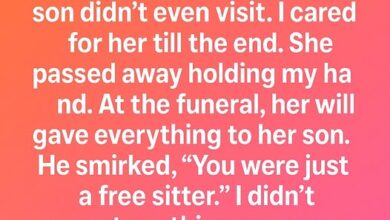
She Left the Porch Light On for Me… I Never Knew Why Until That Night
“The Night the Light Stayed On Longer Than Usual”
A week passed.
A whole week of 8:12 calls — small laughs, grocery lists, crooked lamps, and the soft kind of love that fills the cracks without making noise.
But then came that Thursday.
I called her at 8:12.
She didn’t answer.
I tried again at 8:14.
8:17.
8:19.
Nothing.
By 8:30, my chest felt tight the way it did before school presentations — that quiet panic you pretend not to feel but sits in your throat anyway.
At 8:47, she finally called back.
Her voice sounded different.
Not sick.
Not sad.
Just… far away.
“Oh honey,” she breathed, “I didn’t hear the phone. I was looking for my glasses.”
She laughed, but it wasn’t her usual laugh. It was softer. Less certain.
“Guess where I found them?”
A pause.
“On my head.”
I smiled, but something inside me twisted slightly, the way a loose thread catches on a zipper.
We talked, but she kept losing her words mid-sentence, like her thoughts were stepping off the sidewalk without telling her.
At one point she said:
“You were such a sweet child… always calling me at 8:12.”
“Mom,” I said gently, “you were the one who told me to call.”
“I did?” she whispered. “Well… that was clever of me.”
We laughed, but it sat between us like a fragile glass.
When we hung up, she said:
“Goodnight, honey.
And if I forget to call you tomorrow… you remember for both of us, okay?”
That night, her porch light stayed on long past midnight.
Too long.
Long enough to make me wonder if she had forgotten it…
or needed it.
“Little Things Started Slipping”
The first thing she lost was the TV remote.
Then her keys.
Then her tea kettle — which she later found in the fridge.
But the thing that scared me wasn’t the objects.
It was the moments.
Once, during our 8:12 call, she suddenly stopped speaking.
I thought the line had cut.
But then she whispered:
“Honey… what was I saying?”
She sounded small.
Like the world had shrunk around her.
Another night, she called me at 3 a.m.
“I didn’t wake you, did I?” she asked.
“I just… the house felt too quiet. Quiet like it forgot I was here.”
I drove to her place more often.
Checked the stove.
Labeled the cabinets.
Put her medicines into one of those day-of-the-week boxes she hated:
“It makes me feel old,” she complained.
“You’re not old,” I said.
“You’re just human.”
She smiled.
But the smile didn’t reach her eyes the same way anymore.
One evening, I visited unannounced.
Her porch light was on — but the house was dark.
Inside, I found her sitting on the couch, wrapped in her plaid blanket, staring at nothing.
“Mom?”
She blinked and looked at me like she was flipping through a mental photo album, trying to match a face to a name.
It lasted only two seconds.
Just two.
But those two seconds felt like the floor dropped out from under me.
Then she gasped softly.
“Oh honey. I thought you were a memory walking in.”
A memory.
Not a person.
I held her hand and said:
“Even if your mind lets go… I won’t.”
She squeezed back weakly.
“Honey,” she whispered, “promise me something.”
“Anything.”
“Don’t disappear when I start to.”
“The Night I Became the Light”
Winter deepened.
Her memory loosened.
Days stretched and curled around confusion.
But 8:12 stayed.
Some nights she remembered.
Some nights she didn’t.
And then came the night I’ll never forget:
I called her at 8:12.
No answer.
Again.
And again.
Nothing.
So I drove over.
The town was quiet — a frozen postcard under a soft snowfall.
When I reached the house, the porch light was on.
Glowing.
Steady.
Warm.
I opened the door.
She was asleep in her armchair, blanket tucked around her, phone resting on her chest like a tiny heartbeat.
I knelt beside her and saw the phone screen:
Alarm: 8:12 p.m.
Label: “For him.”
Her memory might not always find me —
but her love still tried.
She woke gently, smiled through sleepy confusion, and whispered:
“Did I miss it?
Did I miss our minute?”
“No, Mom,” I said, brushing her hair back.
“You didn’t miss anything.
I’m here.”
She closed her eyes again, peaceful.
That night, before leaving, I walked onto the porch and touched the warm bulb glowing above the steps.
Her light.
Our light.
Then I drove home and turned mine on too —
not for me,
but for her.
And now, every night at 8:12, no matter what city I’m in or how tired life makes me:
I turn on my lamp.
She turns on her porch light.
Two lights.
Two hearts.
Two memories — one fading, one holding on.
And some nights, when the world feels too big,
and time feels too fast,
and love feels too fragile…
I look at that light and whisper the thing she once taught me:
“People find their way by small, faithful things.”
Because love doesn’t always stay sharp.
It doesn’t always stay clear.
But it stays.
It stays.
It stays.




